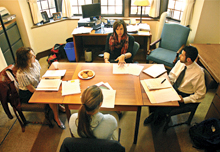Long History, Strong Future of Clinics
"Clinical experience puts color in the empty outlines of the legal comic book."
That's what Alfred E. Conard—Henry M. Butzel Professor of Law Emeritus—wrote in "Letter from the Law Clinic," published in this magazine in 1973.
Nationally, law clinics were first introduced in the late 1960s. A sort of trial period for clinics began at Michigan Law in the 1969 summer term, when Professor J.J. White, ‘62, taught a group of 10 students who took on cases from the Washtenaw County Legal Aid Clinic. White also drafted a rule, which he and then-Acting Dean Charles Joiner submitted to the Michigan Supreme Court, that allowed students to practice in state courts. Students began practicing regularly with the Legal Aid Clinic.
The cases "expose(d) a student to a magnificent menagerie of documents and processes which seldom appear in person in the law school curriculum," White, the Robert A. Sullivan Professor of Law, wrote in a 1969 paper.
Through the years, the popularity of clinics grew, as did the array of options available to students. As many as 13 clinics now are offered at any given time, including the relatively new Human Trafficking, Innocence, International Transactions, and Federal Appellate Litigation clinics.
Because of the growth of clinics, as well as their importance in students' education, the new Law Quad South Hall features a wing for the Clinical Law program, where the clinics will have a consolidated home—a setting with the professional quality of a law firm, but appropriate for legal education.

Michigan Law's emphasis on clinics as part of a student's educational opportunities is exceptional, says Bridget McCormack, associate dean for clinical affairs and codirector of the Michigan Innocence Clinic. She was a student in a clinic at New York University School of Law, and she taught in a clinic at Yale Law.
"They were good programs, but I think Michigan has something really unique," she says. In addition to the range of clinics, she points out that another advantage Michigan Law has is the support of doctrinal faculty.
If it were up to her, McCormack says, all law students would have the opportunity to learn in a clinical setting. "Working on real cases with real people is educationally motivating for a lot of students. It enhances the rest of a student's education. We're teaching a set of values and norms in the industry that students would have a hard time learning in the rest of their legal education."
More information about the State of Legal Education...